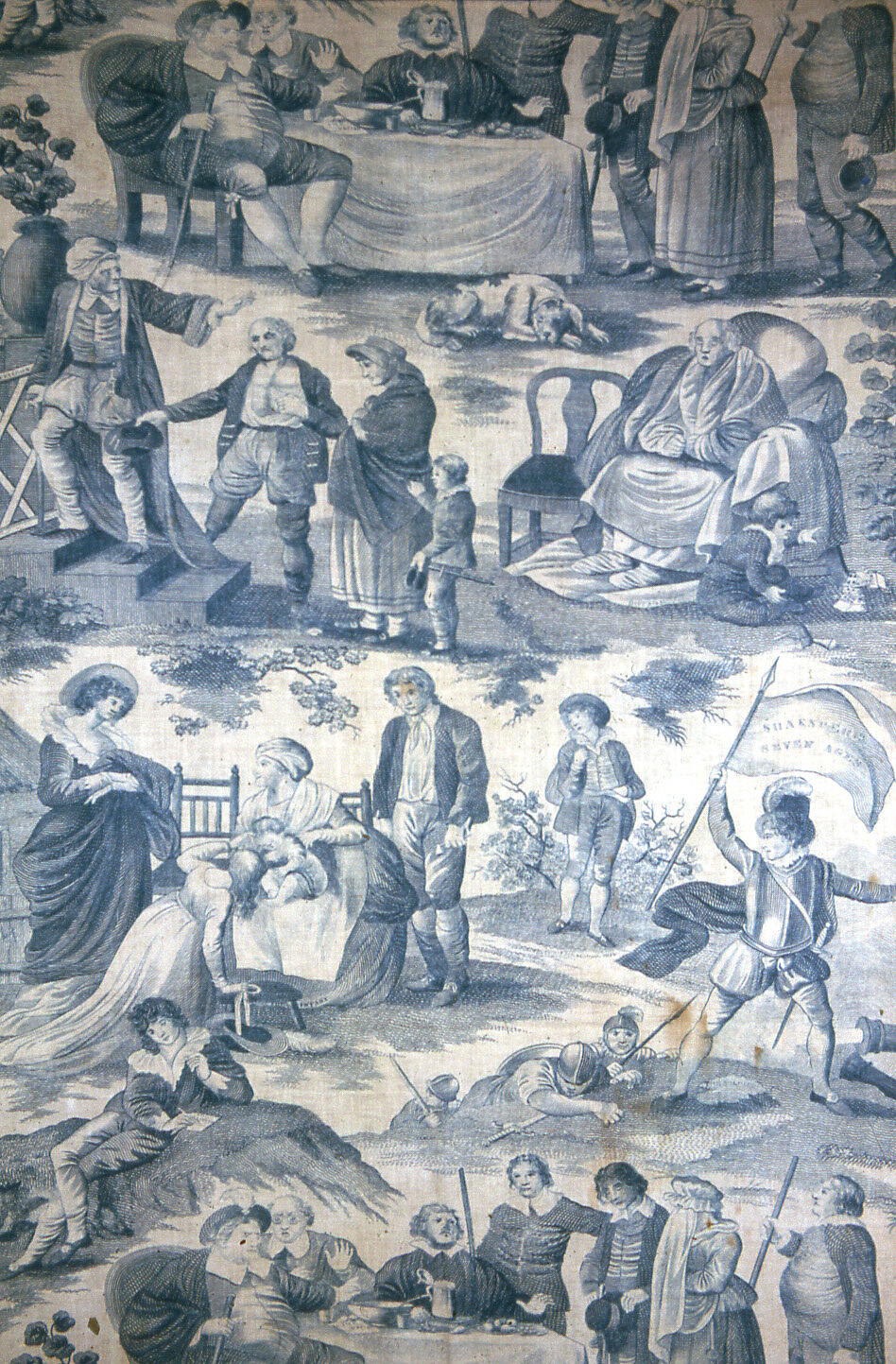RatHoling

Engraved by John Slack:
Shakespeare’s Seven Ages (c. 1805)
"You may now safely refer to me as "Sir."
I'd always felt bothered that I had so little information about the Mayfield family's background. My Great-Grandmother was a Mayfield before she became a Kenaston, and I had a wealth of stories about the Kenaston clan. The Mayfield story petered out in the South just before the Civil War. I suspected they were separationists and Confederates, though, because two generations of the line, my 3rd and 4th Greats, were named Andrew Jackson Mayfield. My stories about them went no further. I suspected them of Southern sympathies during The War because they'd lived in Tennesee, and the elder Andrew married a woman from Georgia. I understand why my forebears revered Andrew Jackson. They loved him because he refused to shine a British Officer's boots during The War of 1812, then routed them out of New Orleans. They probably liked him better because he helped open land for settlement in Florida and Georgia, west to the Mississippi, killing or exiling the natives. His Trail of Tears was cause for enthusiastic cheers for those would-be pioneers waiting for openings from East of the Alleghenies.
So, I started following the stories and checking a variety of sources. I needed some RatHoling if I expected to discover the missing details. The Web holds so much variety that it often overwhelms me. I start scratching, and the afternoon's already gone before I realize it. I daydream my way back through time. I notice small details and head off on side trips to understand the possible implications. I spent much of the day chasing fruitless leads. I stumbled upon seven more generations and some interesting background information late in the day. My eighth great-grandfather was a butcher in the market town of Melton Mowbray in Leicestershire (near Nottingham) until 1653. His grandfather was a knight, Sir John, born in a place called Shelford Manor around 1550. The master of that manor, Sir Miles Stanhope, a member of Parliament, was beheaded in 1553 for conspiring to assassinate John Dudley.
Interestingly, an Archbishop Cranmer had petitioned Cromwell for possession of Shelford, which had recently been a monastery, for his brother-in-law, but Charles I granted it to Stanhope. Early in the Civil War, Shelford was sacked, and most of its defenders were killed by Cromwell's Roundheads, though that was probably just a coincidence. RatHoling produces many such coincidences and dangerous synchronicities.
It's altogether too easy to convince myself that I've actually stumbled onto something significant. I play alternate scenarios in my head, understanding that I can consider little of the available information authoritative. Still, I might resolve something by carefully triangulating and comparing two or three sources. I'd established that Sir John was at least manor-born, placing him on the Royalist side of the impending troubles. Further, he married a Stapleton, one Alice, and the daughter of one Brian of Nottingham. Some further searching involving little heavy lifting found a string of Stapletons stretching back into Normandy before William The Conquerer. My 28th great-grandfather had received a land grant following The Battle of Hastings for an estate in Yorkshire along the River Tees he named Stapylton. A succession of knights, judges, and privy counsellors followed up to my 10th great-grandfather's marriage to my 10th great-grandmother Alice Stapleton. It's easy to conclude that they were both considered members of the peerage. Such marriages often were between peers. If I couldn't find further history on Sir John, I would settle for eighteen additional generations on his spouse's much more noteworthy side. I'm equally related to both.
One of Alice's forebears, maybe more than one, had been the designated Sheriff of Nottingham! Robin Hood might have been up against one of my great-Grands!
The plot was thickening as we closed in on the beginning of open hostilities between Cromwell and Charles I. Our butcher Owen died young, and his market town was occupied by Roundheads just about the time he died. His son Robert was born in Gloucester, a common departure point for headright indentures. He arrived in Virginia's Essex Colony in 1652, aged about seventeen, just after Charles I lost his head while Cromwell’s terror ruled Parliament. That would have been a dandy time for anyone with centuries of Royalist sympathies in their history to disappear into the colonies. His headright indenture would have run about four years, after which he would have been granted land. Subsequent history shows his son Isaac continuing to inhabit property in Essex Colony. He died in 1790. His son James, though, wandered further afield and died in what was called the Indian Reserve in 1780, well before Andrew Jackson had cleared that Crown-designated wild Indian country of its traditional defenders. It's little wonder subsequent generations might worship Andrew Jackson for creating a more secure context for them to continue their conquests.
RatHoling tends to connect history in ways I rarely experience. After RatHoling almost all of my Mother's history, I feel tremendously more connected to my present. It finally feels real to me, not merely stories but something more tangible and, therefore, more meaningful. I am, though, driving myself a little crazy with all the RatHoling I've been doing, for it exclusively provides the kind of nourishment that deepens my hunger and thirst. I was up and RatHoling at one this morning. I might not manage to sleep tonight. This story is a page-turner. The only problem lies in that I have to write each page before I can turn it, and each page requires hours of pleasurably exhausting RatHoling.
You may now safely refer to me as "Sir."
©2024 by David A. Schmaltz - all rights reserved


